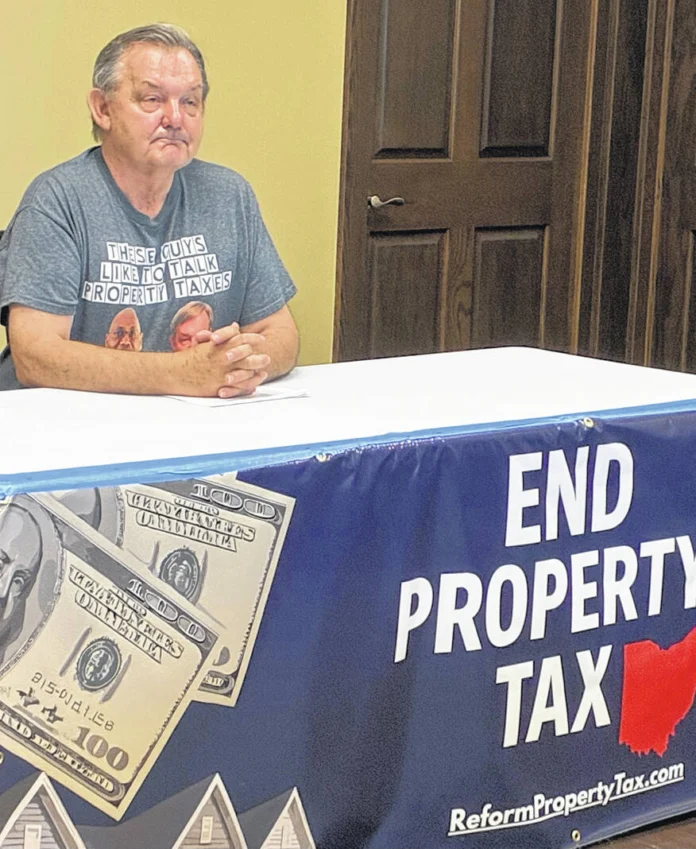By Brian Massie, A Watchman on the Wall
We are republishing the article that appeared in the Lima newspaper.
https://www.limaohio.com/top-stories/2025/07/05/homeowners-seek-property-tax-relief
Homeowners seek property tax relief
By Mackenzi Klemann July 5, 2025

Brian Massie recorded a message for Ohio lawmakers during a signature gathering event in Lima for a citizen-led ballot measure to abolish property taxes through the state’s constitution.
Photos by Mackenzi Klemann | The Lima News
LIMA — Brian Massie wants Ohio lawmakers to know the citizen-led movement to abolish property taxes will continue collecting signatures to bring a constitutional amendment before voters in 2026.
Massie recorded a 15-minute video message to lawmakers and his supporters from the Edgewood Rentals office in Lima on Tuesday afternoon, where he met with supporters gathering signatures for the ballot initiative.
“They think we’ve stopped,” Massie said in the video. “I’m here to tell you (state Sen. Jerry (Cirino), you’re dead wrong.”
Massie is one of five members of the committee behind a citizen-initiated constitutional amendment to eliminate all real estate taxes in Ohio.
Supporters started gathering signatures to qualify for the ballot in May after the Ohio Ballot Board certified the amendment language, the first step toward bringing the amendment before voters.
Massie says more than 1,000 petitioners are now collecting signatures across the state.
Supporters need to collect a minimum of 413,487 signatures, or 10% of total votes cast in the last gubernatorial election, from registered voters in at least half of Ohio’s 88 counties by early next year to qualify for the May ballot, with the deadline to make the November ballot now behind them.
‘We’ve asked for reform’
The movement is gaining popularity on social media, as homeowners across the state contend with sudden increases to their property tax bills from appraisals conducted in the wake of a hot housing market.
The average property tax bill in Allen County increased by 23% in February following the county’s triennial appraisal, which was conducted last year.
Bills increased by as much as 40% in some neighborhoods, while other neighborhoods recorded more modest increases of 10% in their bills, according to estimates provided by Auditor Rachael Gilroy.
Gilroy said appraisals are based on sales from the past three years in compliance with the Ohio Department of Taxation. State law requires assessors to value homes within a range of 90% to 94% of its true market value, or the price at which a seller would sell to a willing buyer on the open market, Gilroy said.
The trend is unsustainable, particularly for seniors who are at risk of being taxed out of their homes, said Beth Blackmarr, an advocate for the Citizens for Property Tax Reform.
Blackmarr said she pays nearly $5,000 a year in property taxes for her two-bedroom bungalow in Lakewood. She purchased the home for $76,000 in 1996. The home is now worth $299,000, she said.
Blackmarr worries her daughter won’t be able to afford the taxes when she inherits the property at this rate, yet she continues to pay taxes on unrealized gains for a home she hasn’t sold, she said.
“We’ve asked for reform,” Blackmarr said. “We’ve proposed reforms. We’ve been around and around with these legislators, and they won’t do anything.”
Lawmakers introduced no fewer than 40 bills aimed at providing property tax relief in the previous legislative session, but none were signed into law, Blackmarr recalled.
One bill “basically just needed the governor’s signature,” she said, “and instead they passed the bathroom bill.”
“I’ve asked over and over again, ‘Would you rather have had the bathroom bill or property tax reform?’ And they’re like, ‘that’s a no-brainer.’”
‘No viable alternative’
The prospect of a constitutional amendment eliminating all property taxes is pressuring lawmakers to act before the issue is decided by voters, which could occur as soon as next May if organizers meet the signature requirement.
Property taxes generate more revenue than the state sales and income tax combined — $24 billion in 2024 alone — a statistic cited by supporters and critics alike.
“There’s really no viable alternative,” said Bailey Williams, a researcher for Policy Matters Ohio, a progressive think tank. “The property tax is a good tax in terms of its reliability, its predictability, but it’s become problematic because we’ve become too reliant on it.”
While counties can levy a sales tax, Williams said state law currently caps county sales tax rates at 2%, and counties with few tourist attractions or retail centers wouldn’t generate much revenue anyway.
Local income taxes can be regressive too, Williams said, because they are levied at flat rates.
Williams said the state became so reliant on property taxes because lawmakers have pursued $13 billion in income tax cuts since 2005, which shifted the burden for school, library and local government funding from the state to homeowners.
The most recent operating budget signed into law by DeWine will phase out one of the two the remaining income tax brackets in favor of a flat 2.75% rate for Ohioans who earn more than $26,050 a year.
The change will save the lowest-income households an average of $28 over the next two years, Williams said. Meanwhile, the highest earning Ohioans, with incomes exceeding $1.7 million, can expect to save $10,000, he said.
“It’s not going to make a big difference in the day-to-day for everyday Ohioans,” Williams said.
A ‘mass exodus’
The legislature’s Joint Committee on Property Tax Review and Reform released its own recommendations in January.
Included in the list of 21 suggested reforms were proposals to expand the homestead exemption, eliminate or limit the use of fixed-rate levies used to avoid the property tax reduction factor or cap on tax rates, and establish a refundable income tax credit for homeowners whose property taxes exceed 5% of their incomes, known as a circuit breaker.
Another proposal, known as House Bill 335, would eliminate inside millage or the ability for schools and other taxing districts to levy a minimum property tax rate without voter approval, though the bill exempts townships.
Lawmakers settled on several reforms contained with their two-year operating budget, which sought to eliminate emergency levies, empower county budget commissions and impose new restrictions on how much money school districts can carry in reserves from year to year.
Public school advocates warned a cap on cash reserves would remove local control from school boards, which rely on reserves for long-term planning and emergencies.
The Buckeye Sheriff’s Association, Association of Police Chiefs, Ohio Prosecuting Attorneys Association and other public safety advocates warned lawmakers against eliminating inside millage, which funds police, jails, court security and emergency medical services.
Gov. Mike DeWine vetoed the changes when he signed the budget into law last week, saying he’d like to convene a workgroup to study the issue instead.
Ohio Senate President Rob McColley issued a statement describing the vetoes as “puzzling,” given the demand for reform.
In his video address, Massie wondered aloud whether DeWine was a “communist in Republican garb,” warning of primaries or a “mass exodus” from the Republican Party if lawmakers don’t override the vetoes.
Massie vowed to collect 1 million signatures for the amendment. “I ask everyone in the state of Ohio to take this, it’s deadly serious. They want to price you out of your home and put you in stack-and-pack apartments,” Massie said.
They come up with stuff for special interests’
The initiative worries Beth Seibert, who wonders how Allen County will pay for public safety if property tax revenue is eliminated.
The county collected $124 million in property tax revenue in 2024. Most of the revenue goes toward schools, while the rest is split between townships, the city of Lima, county general fund, Board of Developmental Disabilities, Metro Park District, Children Services, Senior Citizens and Mental Health and Recovery Services Board.
One-third of Allen County’s general fund budget is reserved for the sheriff’s office and jail operations alone, which Seibert said reflects the county’s priority for public safety.
“As an Allen County commissioner, this inititaive scares me when I consider how the abolishment of property taxes could severely impact our county general fund and all of the individual agencies and services those monies support,” Seibert said.
Blackmarr said amendment supporters don’t want to defund their local schools and public services. Instead, she said, supporters want the legislature to find alternative revenue sources.
Not much of (Ohio sales tax) goes to our localities, it goes to the state. So what about that? What about money from gambling? What about the sin taxes?” Blackmarr said. “They come up with that stuff for special interests, the stadiums and whatever it is they want to put money towards. It would be nice to put that towards our schools, put that towards our EMS, put that towards fire.”
Massie offered a few suggestions of his own like school consolidation, which would save money on administrative roles, but said the responsibility to find a solution lies with the legislature.
“We voted for you to come up with a solution,” Massie said.


Categories: Community Activism, Real Estate Taxes

